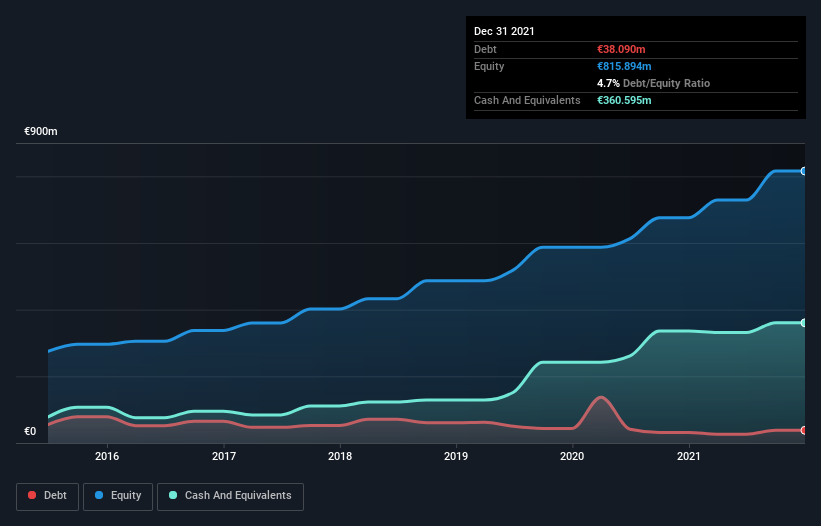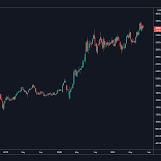Warren Buffett famously said, 'Volatility is far from synonymous with risk.' So it seems the smart money knows that debt - which is usually involved in bankruptcies - is a very important factor, when you assess how risky a company is. As with many other companies Reply S.p.A. (BIT:REY) makes use of debt. But is this debt a concern to shareholders?
When Is Debt A Problem?
Debt and other liabilities become risky for a business when it cannot easily fulfill those obligations, either with free cash flow or by raising capital at an attractive price. In the worst case scenario, a company can go bankrupt if it cannot pay its creditors. However, a more frequent (but still costly) occurrence is where a company must issue shares at bargain-basement prices, permanently diluting shareholders, just to shore up its balance sheet. Of course, the upside of debt is that it often represents cheap capital, especially when it replaces dilution in a company with the ability to reinvest at high rates of return. The first step when considering a company's debt levels is to consider its cash and debt together.
View our latest analysis for Reply
How Much Debt Does Reply Carry?
The image below, which you can click on for greater detail, shows that at December 2021 Reply had debt of €38.1m, up from €31.9m in one year. But on the other hand it also has €360.6m in cash, leading to a €322.5m net cash position.

A Look At Reply's Liabilities
We can see from the most recent balance sheet that Reply had liabilities of €708.6m falling due within a year, and liabilities of €322.6m due beyond that. Offsetting this, it had €360.6m in cash and €535.3m in receivables that were due within 12 months. So it has liabilities totalling €135.2m more than its cash and near-term receivables, combined.
Of course, Reply has a market capitalization of €5.52b, so these liabilities are probably manageable. However, we do think it is worth keeping an eye on its balance sheet strength, as it may change over time. Despite its noteworthy liabilities, Reply boasts net cash, so it's fair to say it does not have a heavy debt load!
Another good sign is that Reply has been able to increase its EBIT by 30% in twelve months, making it easier to pay down debt. There's no doubt that we learn most about debt from the balance sheet. But ultimately the future profitability of the business will decide if Reply can strengthen its balance sheet over time. So if you want to see what the professionals think, you might find this free report on analyst profit forecasts to be interesting.
But our final consideration is also important, because a company cannot pay debt with paper profits; it needs cold hard cash. Reply may have net cash on the balance sheet, but it is still interesting to look at how well the business converts its earnings before interest and tax (EBIT) to free cash flow, because that will influence both its need for, and its capacity to manage debt. Happily for any shareholders, Reply actually produced more free cash flow than EBIT over the last three years. That sort of strong cash conversion gets us as excited as the crowd when the beat drops at a Daft Punk concert.
Summing up
We could understand if investors are concerned about Reply's liabilities, but we can be reassured by the fact it has has net cash of €322.5m. And it impressed us with free cash flow of €170m, being 107% of its EBIT. So is Reply's debt a risk? It doesn't seem so to us. Over time, share prices tend to follow earnings per share, so if you're interested in Reply, you may well want to click here to check an interactive graph of its earnings per share history.
If, after all that, you're more interested in a fast growing company with a rock-solid balance sheet, then check out our list of net cash growth stocks without delay.
New: AI Stock Screener & Alerts
Our new AI Stock Screener scans the market every day to uncover opportunities.
• Dividend Powerhouses (3%+ Yield)
• Undervalued Small Caps with Insider Buying
• High growth Tech and AI Companies
Or build your own from over 50 metrics.
Have feedback on this article? Concerned about the content? Get in touch with us directly. Alternatively, email editorial-team (at) simplywallst.com.
This article by Simply Wall St is general in nature. We provide commentary based on historical data and analyst forecasts only using an unbiased methodology and our articles are not intended to be financial advice. It does not constitute a recommendation to buy or sell any stock, and does not take account of your objectives, or your financial situation. We aim to bring you long-term focused analysis driven by fundamental data. Note that our analysis may not factor in the latest price-sensitive company announcements or qualitative material. Simply Wall St has no position in any stocks mentioned.
About BIT:REY
Reply
Provides consulting, system integration, and digital services based on communication channels and digital media in Italy and internationally.
Flawless balance sheet, undervalued and pays a dividend.
Similar Companies
Market Insights
Weekly Picks


Looking to be second time lucky with a game-changing new product

PlaySide Studios: Market Is Sleeping on a Potential 10M+ Unit Breakout Year, FY26 Could Be the Rerate of the Decade


Inotiv NAMs Test Center

This isn’t speculation — this is confirmation.A Schedule 13G was filed, not a 13D, meaning this is passive institutional capital, not acti
Recently Updated Narratives


Inotiv NAMs Test Center


Goldman Sachs Group (GS) The Titan Reclaims Its Crown: Return to Core Excellence


Parker-Hannifin (PH) The Industrial Alchemist: Transforming Motion into Margin
Popular Narratives


Is Ubisoft the Market’s Biggest Pricing Error? Why Forensic Value Points to €33 Per Share


Analyst Commentary Highlights Microsoft AI Momentum and Upward Valuation Amid Growth and Competitive Risks


The "Physical AI" Monopoly – A New Industrial Revolution
Trending Discussion




